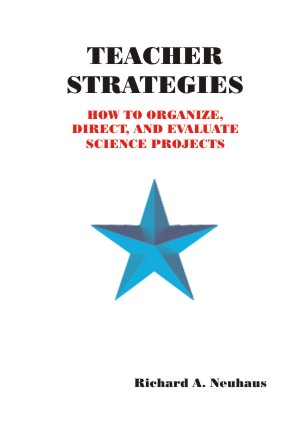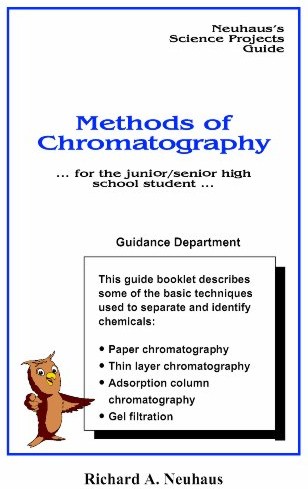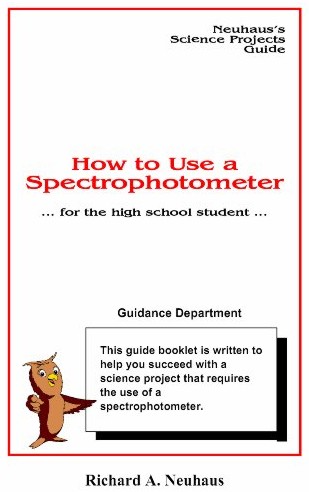Gormley
Publishing
Science Project Guides for Teachers and Students
Preparing for the Science Fair details what you'll need to do to get ready for the science fair. Writing the Science Project Report helps you prepare a report of the results from your science project. Methods of Chromatography details the art of separating and identifying chemicals. How to Use a Spectrophotometer helps in projects which require the use of a spectrophotometer. How to Use a Multimeter helps the student understand the use of the multimeter to obtain the data required, without delving into the technical details behind the operations.
 Teacher Handbook — Teacher Strategies: How to Organize, Direct, and Evaluate Science Projects
Teacher Handbook — Teacher Strategies: How to Organize, Direct, and Evaluate Science Projects
Learn how to incorporate student science projects as a supplement to your curriculum ... Discover ways to keep projects on track ... Read about techniques for evaluating projects ... And much more! This 58-page handbook is designed to walk teachers through the intricacies of a science fair, and to help them encourage their students to investigate the wonderful world of science.
Also available in eBook at
Amazon
Barnes & Noble
Kobo
What's Inside
The Science Project: Voluntary or Required? • Teacher's Time Schedule • Projects for All Students • When to Start Projects • Sources of Project Ideas and Techniques • Techniques and Open-Ended Project Ideas • Treating the I-Don't Know-What-to-Do Syndrome • Steps to Complete a Science Project • The Alternative Project • Projects at the High School Level • The Problem of Evaluating the Project • Checklists ... Ranking ... The Rating System • Evaluating the Report.Science Fairs: Local Science Fairs • Regional Science Fairs • Judging at Local and Regional Science Fairs • State and international Science Fairs.
Appendix: Statistics of Selected Science Fairs.
 Guide Booklet — Preparing for the Science Fair
Guide Booklet — Preparing for the Science Fair
Straight-forward guide aimed at helping the student prepare for a science fair at the classroom, local, regional, state, or national level.
Topics covered
Awards, Recognition, and Course Grades
The School Science Fair
Preparation:
The Project Display Board • The Project Equipment and Results • The Project Report • Rehearse Your Presentation • What the Judge Might Ask • Skit: "Ms. Sweetbird's Student at the Science Fair."
Regional and State Science Fairs
INTEL Science Talent Search
How to Be a Winner
 Guide Booklet — Writing the Science Project Report
Guide Booklet — Writing the Science Project Report
The author gives concise instructions on writing the science project report. He explains the necessity of writing a report and identifies the key elements a science project report should contain.
Topics covered
Why Scientists Write Reports
Why You Must Write a Report
The Style and Format of Your Project Report
What the Report Sections Include
The Title Page • Acknowledgements • Introduction • Materials and Procedures • Results • Discussion • Summary • References.
The Final Draft
Writing Skills
Final Word
Recommended Reading
References
 Guide Booklet — Methods of Chromatography
Guide Booklet — Methods of Chromatography
This guide booklet describes some of the basic techniques used to separate and identify chemicals. Excellent photographs and illustrations throughout.
Also available in eBook at
Amazon
Barnes & Noble
Kobo
Methods and topics discussed
Paper Chromatography
A Simple Experiment Tells All • Chromatography • How the Method of Paper Chromatography Works • Solvents • The Spot Technique of Paper Chromatography • Materials Needed • Matching Controls • Reagents • Preparation of Unidentified Mixtures Prior to Separation • Some Hazardous Solvents to Avoid • Selecting a Solvent • Some Visualization Reagents • Quantitative Analysis.
Thin Layer Chromatography (TLC)
How to Coat Glass Microscope Slides • TLC Kits • Solvents.
Adsorption column chromatography
Microscale Columns • Packing the Column • Sample Preparation • The Macroscale Technique • Elution • Bands • Experimental Conditions • Sorbent Selection Table.
Gel filtration
Example Project.
Other systems of chromatography
Electrophoresis • Other Methods
Suggested Projects
Variables for Further Study • A Final Note on All Techniques
References
 Guide Booklet — How to Use a Spectrophotometer
Guide Booklet — How to Use a Spectrophotometer
This guide booklet is written to help you succeed with a science project that requires the use of a spectrophotometer. Author provides details on equipment and procedures. Colored images and illustrations augment the text.
Also available in eBook at
Amazon
Barnes & Noble
Kobo
Topics discussed
- Light and Color
- The Choice of Instrument
- Guts of a Spectrophotometer
- How the System Works – Guts and All
- How to Find the Analytical Wavelength of a Substance
- Generic Operating Instructions
- The Importance of the Blank
- Plastic Versus Glass
- Matching Cuvettes
- Sample Concentration
- Quantitative Analysis
- The Standard Curve
- Preparation of Solutions
- The Setup
- Procedure
- Protein Analysis
- How to Use the Standard Curve
- Testing of an Unknown Protein
- Cleaning Up
- Other Methods of Protein Assay
- The Filter Colorimeter
- References
 Guide Booklet — How to Use a Multimeter
Guide Booklet — How to Use a Multimeter
This guide booklet explains how to use a multimeter to obtain the data needed, without going into the technical details behind the operations. Various photographs and illustrations augment the text.
Also available in eBook at
Amazon
Barnes & Noble
Kobo
Topics discussed
Multimeter in Electricity and Electronics
Operations
- Switches and Scale Ranges
- The Ohm Scale
- Jacks and Test Leads
- VOM Batteries
- Connecting the VOM to a Circuit
- Color Codes
- How to Measure Volts
- How to Measure Ohms
- How to Measure Amps
- Measuring amps
- Measuring volts and ohms to calculate amps
Troubleshooting Tips
Semiconductors
References
Recommended Reading